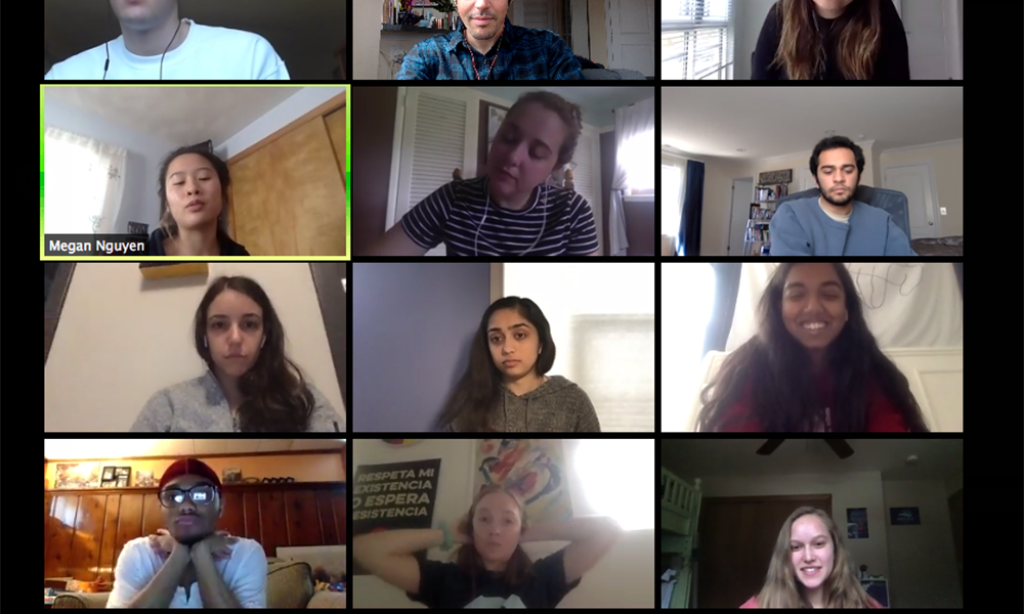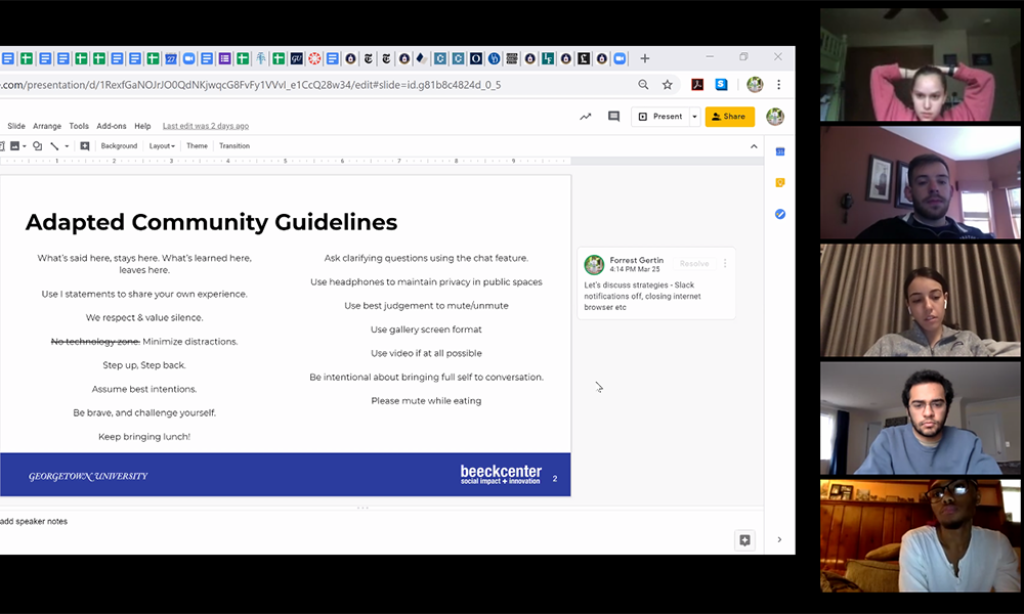Community Building and Resilience: Student Programs in the Wake of COVID-19
April 9, 2020 | By Matt Fortier
On Friday, March 6, Georgetown students put their laptops and books away and left Washington, D.C. for spring break. But while they were taking that much-deserved rest, COVID-19 exploded across the U.S. and students were told not to return to campus. Since then, the pandemic has affected every facet of student life. Students found themselves separated from family or suddenly living back at home, striving to maintain focus and motivation in virtual classes, while grappling with this crisis and its far reaching impact, from health to economic hardship.
As educators around the world work to adapt the ways they support students, here at the Beeck Center, we’ve had to rethink how we prepare students to be effective leaders for positive social impact. As we recalibrate our work and lean into the core strengths of our student programming, community-building, reflection, adaptation, and resilience will be of paramount importance.
One of our core values is Authentic & Constructive Communication, so when Georgetown announced its transition to a remote environment, we quickly reached out to our entire team, including students, providing information, sharing resources, and beginning contingency planning. With genuine care for one another, we have consistently emphasized that the health and well-being of our staff and their families is vital. We’ve backed this up by providing flexible work schedules, sharing tips for personal care, and listening to each other through frequent “pulse checks”. By opening a dialogue and demonstrating our commitment to each individual student, we’ve set a healthy foundation from which to move forward.

Our Discern + Digest series, a safe and brave space for challenging and often uncomfortable conversations, is a big part of the feedback loop our student analysts participate in. But body language cues, much better conveyed in person, are critical so it would have been easy to postpone or cancel. Instead, we felt strongly that in the wake of COVID-19, a space for dialogue and reflection was needed more than ever, so we doubled-down on our effort, switching to a virtual environment and adapting the conversation to acknowledge the pandemic and its impact on all of our lives. By modeling resilience and adaptability, we sent a clear message–we can unite and collectively problem-solve to overcome a common challenge.
Led by Forrest Gertin (SFS’20), more than a dozen students joined from remote positions across the United States to share their workspace, their lunch, and their ideas. They reviewed their community guidelines, discussing modifications and additions for a virtual format, most notably, how to acknowledge that the “no technology zone” was now anything but. In (re)establishing norms, we shared a vision for rediscovering our community.

The speaker, Molly Porter, opened by sharing some personal reflections before asking how we could reconcile our understanding of community with others while physically distancing in an effort to “flatten the curve.” Students responded eagerly, sharing their challenges and highlighting new ways to connect with their community. The conversation made it clear: we are resilient, we can adapt, and now more than ever, we need to listen to each other and reinvigorate our human connections.
“I was in a pretty bad space. I decided to join the call because I knew it would be full of positivity and compassion. Also, I would be able to give myself time to reflect on how I’m feeling amid everything. I am very grateful for the D+D sessions because it provides space for me to find community and reconnect with myself without pressure.” -Donovan Taylor, MSB’20
We are fortunate to have strong collaborators across Georgetown University, from the Center for New Designs in Learning & Scholarship, which readily deployed tools and resources for instructional continuity, to the Cawley Career Center, which has adapted its career support to provide virtual advisor meetings while working with employers to move events to virtual formats and reaching out to alumni to cultivate networking opportunities.
We are excited to witness an inspired spirit of collective problem-solving and sharing of ideas and resources from these partners and the greater social impact community. The Beeck Center remains firm in its belief that to solve the most complex problems of our time, we must work across sectors, leveraging all the tools and knowledge at our disposal. Today’s pandemic is no exception and we hope we can model an approach to our students through how we adapt, collaborate, and rise to the challenge in front of us.
Do you have a best practice or resource to share? If so, please let us know!
Here are some resources that we’ve shared with our students:
Career Planning
- How to Advance Your Career While Working Remotely During COVID-19
- Tips for Job Searching & Career Planning During the Coronavirus
- Getting the Class of 2020 Hired
- Volunteering Online During COVID: How To Support Social Impact Virtually
Managing Remote Work
- The Complete Remote Work Playbook
- 12 Ways to Work Remotely During COVID-19
- COVID-19 Has My Teams Working Remotely: A Guide for Leaders
Wellness
- Crisis Management Resources from the Miller Center
- Second Day Summer Bridge Program
- Being a Successful Student Online
- The Wellbeing Project
Stay connected to the Beeck Center
Sign up for our newsletter and get regular updates on what’s happening at the Center, news about our portfolio interests, social impact job opportunities and more!
